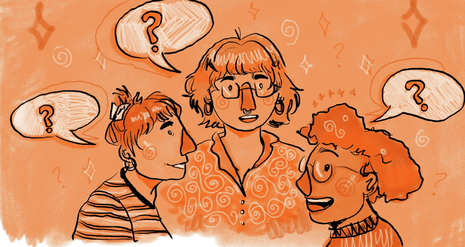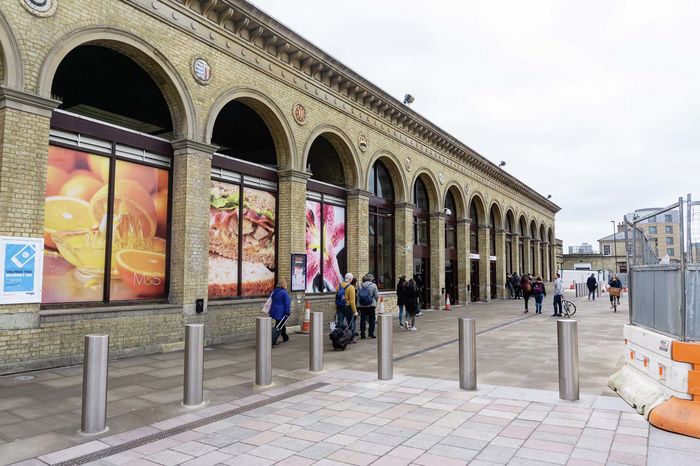It’s ok not to know it all
As another term of academic rigour rolls in, Alice Mainwood argues that we shouldn’t feel as though we need to be full-formed academics just yet.

We’re all in a bad habit of pretending that studying at Cambridge isn’t as difficult as it really is. At least, that’s what I like to think, instead of resigning myself to the possibility of actually just being worse at my degree than everyone else.
I’m just as guilty as the next English student for upholding this pretence. I love getting out the fancy rhetorical terms and any clever-sounding reference to the Aeneid whenever I’m blessed with the briefest of moments where I feel able to. But, at the end of the day, I don’t think I’m alone in spending the final few moments before knocking on a supervisor’s door wondering what I’m going to do if I’m asked about that one piece of reading that I just couldn’t detangle for love nor money. I don’t always get it, and definitely don’t always know the answers, and supervisions have a nasty potential to bring about a self-doubt-inducing competitiveness. Really, I’m quite sure it’s not just me. Lots of us feel at least a little bit phobic of looking stupid.
“supervisions have a nasty potential to bring about a self-doubt-inducing competitiveness”
That fear makes us relentlessly pretend that we do know all the answers, and instils that horribly adamant resistance to saying ‘I’m not sure’, or ‘sorry, I don’t think I’ve understood the question’. It’s almost as if we view every supervision as a repeat of our admissions interview. We use them to perform, trying desperately to show what we already know, what we can deduce, what we don’t need help with. It doesn’t make for an easy environment to learn in. Sure, we will all inevitably yearn for our supervisors approval, and understandably so. But it’s a shame we let that desire for respect get in the way of admitting when we need their help.
The way we’re examined only really encourages us to compare ourselves to others, and eggs on fear of our own failures by forcing uncomfortable comparisons. So, all things considered, I am at least grateful that the marking and assessment boycott granted me a healthy recovery period between Easter term and having to comprehend the reality of my exam results. And as I bask in the last few days of this blissful ignorance, I do feel the blessing that it has been to have thus far escaped my brutal ranking beside every single one of my peers, into a single, neatly ordered list. Number 1 here, number 185 there. I don’t want to know exactly how many people know more about Shakespeare than me, nor do I want to know what number of my peers can analyse Chaucer’s most obscure verse more succinctly than I can.
“I wanted to find academic fulfilment, not pull myself through an 8 hour slog five times a week”
My pending crisis of faith in academic institutions’ ability to nurture a love of learning has made me recall my first interaction with a Cambridge academic as a fresher. We sat in what clearly used to be a student’s room until a very recent, very lacklustre attempt to turn it into a supervision room. The academic told me that I should find the workload here pretty manageable if I treated my degree at Cambridge like a 9-5 job. It felt like a kick to the gut. We often forget how much we sacrificed and how hard we worked to be here, but in that moment I felt that sacrifice acutely. All that work for a 9-5 job? I wanted to find academic fulfilment, not pull myself through an 8 hour slog five times a week solely in the name of two treasured days off.
Maybe that is the problem; we treat our degrees like jobs. Maybe that’s why we try so hard to disguise our uncertainty or need for help. We’ve just forgotten that we’re here to learn, not perform.
Perhaps it sounds a bit naïve for a second year who should be plotting internship plans and schmoozing on LinkedIn, but I want to enjoy my degree. I applied to Cambridge because I like learning, not because I actually wanted to get myself in tens of thousands of pounds of debt whilst essentially working an office job. I don’t want to spend what remains of my degree pretending I’m already as clever as I could be. What a respite it would be to sometimes say ‘I’m not sure I know the answer, sorry,’ without feeling like I’ve just admitted to scamming my way into Cambridge by having a secret genius twin do my interview, plagiarising my A-Level exams, and threatening an admissions tutor with the fruition of all their worst nightmares if they don’t give me a place.
We all worked hard to be here, but the real result isn’t the place we earned on our course, but the degree we’ll get at the end of it. We’re not meant to have reached our full potential yet. It would be so much easier for us to get there if we admitted that our degrees are really quite hard work, and that we don’t know all the answers.
 Interviews / Lord Leggatt on becoming a Supreme Court Justice21 January 2026
Interviews / Lord Leggatt on becoming a Supreme Court Justice21 January 2026 Features / Are you more yourself at Cambridge or away from it? 27 January 2026
Features / Are you more yourself at Cambridge or away from it? 27 January 2026 News / Reform candidate retracts claim of being Cambridge alum 26 January 2026
News / Reform candidate retracts claim of being Cambridge alum 26 January 2026 News / Stand Up To Racism protests in solidarity with Minneapolis marches28 January 2026
News / Stand Up To Racism protests in solidarity with Minneapolis marches28 January 2026 News / Vigil held for tenth anniversary of PhD student’s death28 January 2026
News / Vigil held for tenth anniversary of PhD student’s death28 January 2026










